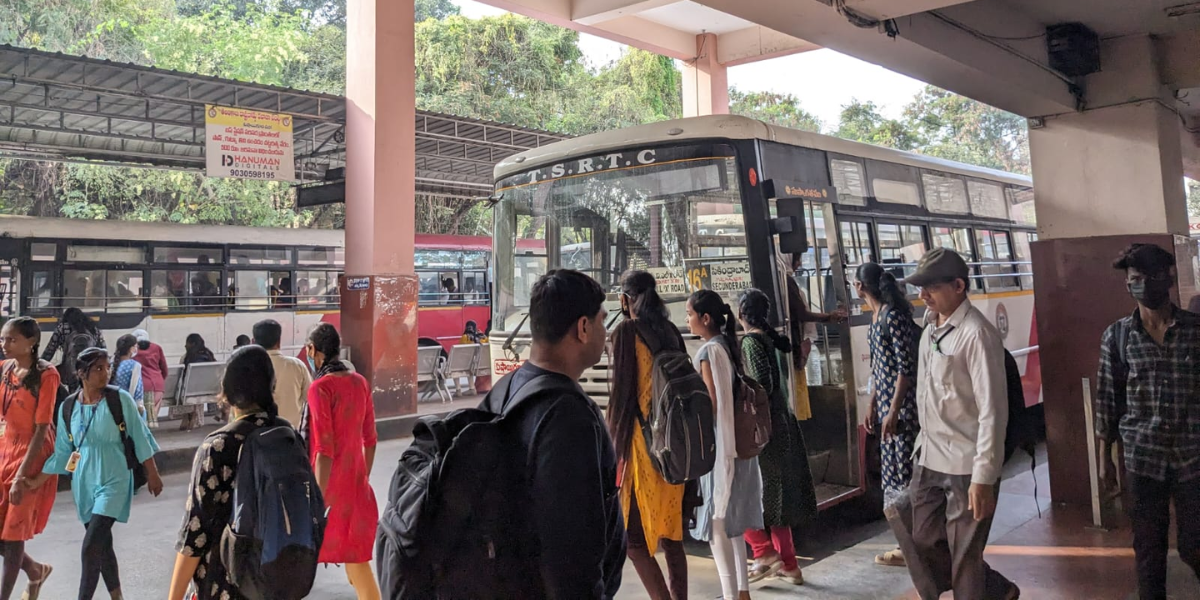The Mahalakshmi scheme has swiftly emerged as a game-changer, proving to be a significant boon for women from diverse backgrounds.

Women waiting to board an RTC bus at ECIL depot. (Deepika Pasham/South First)
Nearly two months have passed since the initiation of the Mahalakshmi scheme by Telangana Chief Minister A Revanth Reddy — the first among the Congress party’s six poll guarantees. The initiative empowers women of all ages and transgender individuals, offering them the invaluable privilege of travelling for free on Telangana State Road Transport Corporation (TSRTC) buses.
The Mahalakshmi scheme has swiftly emerged as a game-changer, proving to be a significant boon for women from diverse backgrounds. South First takes you on a journey to explore the firsthand experiences of women who traverse the city and the state, all with the powerful allure of the “Zero ticket” in hand.
Among the beneficiaries is K Sathiamma, a vegetable vendor commuting on TSRTC buses with her leafy produce from Medak to Hyderabad. Previously reliant on her son for the occasional ride, the Mahalakshmi scheme has transformed her routine.
Sathiamma tells South First, “I’ve been selling leafy vegetables for nearly a decade. I reside in Medak but I frequently travel to weekly markets in Hyderabad. My son dropping me off is now a rarity.”
She adds, “I am genuinely pleased with the scheme as it relieves me of the burden of spending my earnings on bus tickets, which can range from ₹20 to ₹30, depending on the bus station. Now, I manage to save around ₹1,000 every month. What I save will serve as a financial buffer for potential health emergencies, considering we don’t set aside separate savings for our health.”
Transwomen D Nandini and L Sonali also attest to the Mahalakshmi scheme’s benefits.
Nandini tells South First, “I used to be a regular employee with a free handicapped bus pass, while Sonali had to pay around ₹1,200 in bus charges. Last year, she opted for a bus pass, but with the introduction of the Mahalakshmi scheme in December, we decided not to renew it. Sonali frequently travels for workshops and alternate-day journeys, saving ₹1,200 every month. These savings have proven helpful for our household expenses. We reside in Uppal, traveling regularly to Secunderabad, our usual destination.”
P Madhavi, owner of a vehicle repair shop in Malakpet, Hyderabad, and a resident of Anandbhag, says, “I wholeheartedly endorse TSRTC buses for travel, anytime and any day. For over a decade, I have been commuting regularly to my shop in the city. To reach my destination, I need to take two buses, and due to the irregular timings of one bus, I often opt for a share auto.
“With a bus pass costing nearly ₹1,350, now, I travel for free on buses and though I might still need to take an auto, I save over ₹500 each month. As a middle-class woman, I believe this saved amount can prove invaluable during emergencies.”
D Shailaja’s household champions her independence, and she doesn’t lean on her husband or children for guidance during solo travels. Identifying herself as a typical homemaker with a penchant for penny-pinching, she contemplates her infrequent visits to her siblings’ homes.
However, armed with the perks benefit of free bus travel, she now finds it remarkably convenient. She embarked on an exploration of the Numaish (Nampally exhibition) just last week.
Hema Kumari articulates her eagerness to traverse the festive landscapes aboard TSRTC special buses, particularly aiming for destinations like Srisailam, Yadagirigutta, and parts of Karnataka.
While acknowledging the availability of various travel packages, she fervently emphasises the liberating sensation she experiences while using the “Zero-ticket” service to Srisailam. Anticipating her forthcoming journeys, Hema looks forward to immortalising her experiences through videos on Instagram.
Ensuring an adequate number of buses on specific routes is crucial for improvement, say these women.
J Krithika, an engineering graduate in her second year at a private institution, opted to forego traveling by the college bus — that her parents pay nearly ₹30,000 for — and chose free travel on TSRTC buses.
She highlights the need for more buses on Route 281 to Ghatkesar as she often observes her friends facing challenges with the availability of buses like 24S from Suchitra to ECIL, leading to instances of footboarding.
As these diverse voices echo the positive impact of the Mahalakshmi scheme, the call for continued improvement resonates — ensuring more buses on specific routes and addressing logistical hurdles for a seamless experience for all.

Jul 26, 2024

Jul 26, 2024

Jul 26, 2024

Jul 25, 2024

Jul 25, 2024

Jul 25, 2024